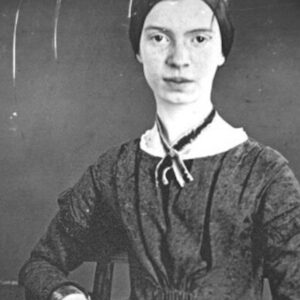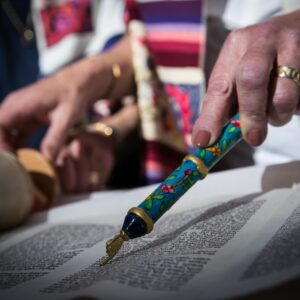“…and Carlos Drummond de Andrade,” my dear friend Don Morrill added.
I had just read one of Don’s new poems, a simple yet profound meditation on a stone in the speaker’s hand. The stone “doesn’t know its life beyond” itself: “things said in a day,” thoughts, dreams. The speaker could easily toss it away where “it would fall somewhere in all I’m not seeing,” but he doesn’t. He keeps it, and, as he writes in the poem, it keeps him. A liberating reminder that human consciousness is only a portion of life itself.
I keep a few small stones—a couple from Israel, a couple from Whidbey Island, Washington—near my meditation bench in my study. Some days, when anxiety zig-zags around my nervous system, I pick up one of the stones, hoping that its weight in my palm will ground me, as in bring me to solid ground. A body doesn’t fret about work, family, friends, God. With the stone in my palm, whom should I fear?
I wrote back to Don. What a fine addition to the mini-genre of stone poems: Charles Simic’s “Stone” (“Go inside a stone. That would be my way.”); Zbigniew Herbert’s “Pebble” (“Pebbles cannot be tamed./To the end they will look at us/with a calm and very clear eye.)
Don wrote back, “And Carlos Drummond de Andrade.” Yes! I vaguely recalled his poem. I must have first read it in Another Republic, Charles Simic’s and Mark Strand’s anthology of international poetry in translation. I need to find my copy… now!
Frustrated when I couldn’t find Another Republic among the thousands of books in my home study, I tried to remember if I had taken it to my office at school. I visualized the bookshelf of anthologies, scanning the titles to see if I could locate it. My frustration intensified when I couldn’t, through the haze of memory, see it. I haven’t been to campus since mid-March. You know why. The book with the poem I need right now is tantalizingly within reach: six-minute drive to campus, two flights up, an office at the end of the hall. The yellow and black cover, the yellow and black cover: I can see that! I just don’t know where it’s located. The anthology edited by two of my touchstone poets when I was falling into poetry and it was falling into me: finding that book was about more than the one poem. I needed to know that physical connection to my past.
*
“Homage to the Runner,” Marvin Bell’s column in The American Poetry Review that ran from 1975 to 1978. As I was learning how to read and write poems, Bell’s column was the first thing I turned to whenever a new issue of APR arrived. I had forgotten about the column until I pulled Vol. 5/No. 4/1976 from a stack of APR’s in my study. A subscriber since 1975, I’ve kept every issue since then.
Zbigniew Herbert’s great poem “Why The Classics” is featured on the back page. In section 1, Herbert writes about Thucydides telling “the story of his unsuccessful expedition” to save Amphipolis from the “hands of Brasidos/because Thucydides was late with relief.” The price he paid for that loss? “Lifelong exile.”
Here’s section 2:
generals of the most recent wars if a similar affair happens to them whine on their knees before posterity praise their heroism and innocence they accuse their subordinates envious colleagues unfavourable winds Thucydides says only that he had seven ships it was winter and he sailed quickly
Have you watched any of our President’s coronavirus briefings? Have you paid attention to anything he’s said these last three years?
The first poem in this issue is Kenneth Rexroth’s late poem “On Flower Wreath Hill,” set in Japan, a meditation on, among other things, mortality and impermanence.
In section V, Rexroth writes,
This world of ours, before we Can know its fleeting sorrows, We enter it through tears. Do the reverberations Of the evening bell of The mountain temple ever Totally die away?
Memory echoes and reechoes Always reinforcing itself. No wave motion ever dies.
The white waves of the wake of The boat that rows away into The dawn, spread and lap on the
Sands of the shores of all the world.
What motion does a virus make as it spreads?
*
Bell’s column in that issue, eventually republished in Old Snow Just Melting with the title “Learning from Translations,” is based on the then forthcoming book Another Republic: European and South American Writers. Looking at American poetry of the period through the lens of the poems included in that anthology, Bell observes,
“In the world of poetry, much American poetry seems provincial. We have been technocratic in our internalization of subject matter, easily adopting the imagistic tendencies of others but refusing a place in our work for the fullest range and variety of human expression and emotion we permit elsewhere.”
American poetry has moved on. But America itself, the government and some of its people? Even in the midst of a pandemic, there are those who are doing their damned best to refuse a place for the fullest range, variety, and value of human expression, human experience.
*
“A Pity. We Were Such A Good Invention.” That’s one of the late, great Israeli poet Yehuda Amichai’s poems, translated from Hebrew by Assia Gutmann, included in Another Republic and discussed by Bell.
They amputated Your thighs off my hips. As far as I’m concerned They are all surgeons. All of them.
They dismantled us Each from the other. As far as I’m concerned They are all engineers. All of them.
A pity. We were such a good And loving invention. An airplane made from a man and wife. Wings and everything. We hovered a little above earth.
We even flew a little.
I probably first read this poem in Bell’s column. And I probably first read it in Israel—the July/August 1976 issue mailed to me there where I was beginning what turned out to be a three-year stay. That was two years before I met Amichai, who read with the Palestinian writer and poet Anton Shammas to kick off a series of readings I was organizing at a club in Jerusalem. By then, I knew Amichai was one of my poets. But this poem: it wasn’t the one that drew me toward Amichai.
Only now, almost 45 years later, when I read it again, did the poem open to me.
This husband and wife, this man and woman, they could be any contemporary couple torn apart by forces beyond their control. A pity. They were such a good and loving invention. A little like another couple we know, right? The ur-couple, God’s finest creations. What about these surgeons, these engineers who amputate and dismantle them? Who are they?
Bell reads the poem as a political poem “put in the locality of love.” I’d add that love is also in the locality of politics. The politics of our moment, more than a half-century after Amichai’s poem was written? Divisiveness. As a nation, we are divided. Who are the “surgeons” and “engineers” dividing us, destroying the possibility of even a modest miracle—“we even flew a little”—that can happen when we are living in a culture characterized by love?
But now, right now, it’s not politics alone distancing us, one from the other. It’s disease. It’s a virus. A virus doesn’t have an ideology. It has no national identity. It needs no passport to cross borders. It isn’t personal. It’s life itself being itself. In response to this virus, we can turn against each other or turn toward each other. So many of us are turning toward each other, in whatever ways we can. And then there are those “surgeons” (not you, dear frontline health care workers) and “engineers” (not you, all of you in industries large and small who have turned your efforts from building vehicles, brewing beer toward making everything we need to overcome this pandemic)—but the other “surgeons” and “engineers” turning us against one another.
*
I would like to go to my office to see if, indeed, my copy of Another Republic is there. But I’m not willing to take the chance. Anyway, I have what I have right here: the past in the present, all that I can hold in my hands and my heart: moldering newsprint, the waves of the wake of a boat that wash up on the shores of the world, and a memory of flying a little.
Richard Chess directed the Center for Jewish Studies at UNC Asheville for 30 years. He also led UNC Asheville’s contemplative inquiry initiative for ten years. He’s published four books of poetry, the most recent of which is Love Nailed to the Doorpost. He’s on the eve of retirement. He’s a lead organizer of the upcoming Faith in Arts Institute: An Exploration of the Intersections of Faith, Spirit, and Art. You can find out more about and register for the institute here. You can find him at www.richardchess.com





